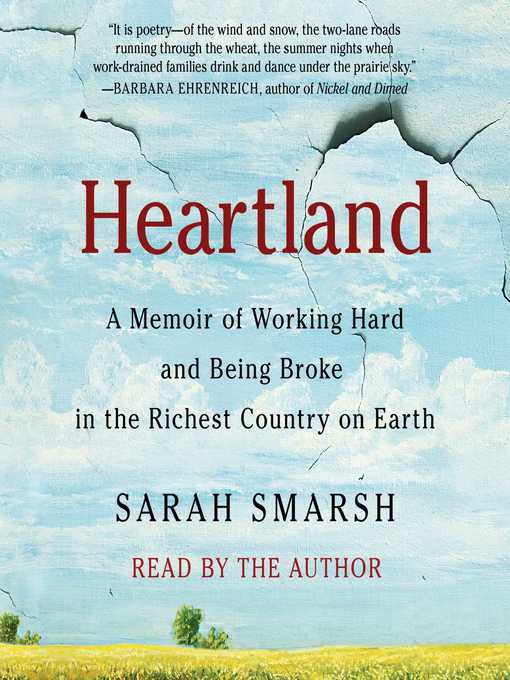Vo 1 Chris Vo 4 April 2021 Professor Duangboudda Anthropology 1 Capitalism in the Richest Country on Earth The book, Heartland: A Memoir of Working Hard and Being Broke in the Richest Country on Earth by Sarah Smarsh, is a memoir to August, Sarah Smarsh child if she had one, about the generationational poverty that occurred in her family. Smarsh was the one to break out of the social class.
- Smarsh's Heartland is a book we need: an observant, affectionate portrait of working-class America that possesses the power to resonate with readers of all classes.' - San Francisco Chronicle 'Combining heartfelt memoir with eye-opening social commentary, Smarsh braids together the stories of four generations of her rural red-state family.'
- But as journalist Sarah Smarsh ’05SOA writes in her powerful, vitally relevant book Heartland, “You can go a very long time in the country without being seen.” Smarsh was born in rural Kansas in 1980 — the dawn of a decade that would be marked by Reagan’s trickle-down economics, welfare cuts, and the early stirrings of the housing crisis.
Heartlandby Sarah Smarsh isn’t a book about Malawi, but it is a book about poverty. Smarsh writes about growing up in the United States among the rural working poor. Her story isn’t the story of every poor American, nor every poor person in the world. Smarsh tells only one story: her family’s story. Weaving in research and history, she investigates American poverty myths. These myths are specific to the US, yes. But they also affect global perceptions of poverty. This is important to examine.

Poverty Myth #1: The poor remain poor because they are lazy.
No one in Smarsh’s family was ever not working. They worked wheat fields, construction sites, highway diners, county court offices, and retail stores. The labor of being poor takes different forms than traditional work, too. The constant hustle. The bill-counting on weekends. The fireworks stand on the county line for extra cash. In Malawi, the extra work is a two-hour walk to the health center. A one-hour walk to the water well. A garden. A popup stand at the market.

Poverty also demands psychological labor. In Malawi, this labor is intensified by hunger. Farmers ask themselves, “Will there be enough rain for the crops to grow? But not too much rain to flood the fields? Will I have enough food to survive the hungry season?” Hunger affects mental health, breeding anxiety and depression. Stress is a type of work. It is a work that takes a toll on both the body and the spirit.
Poverty Myth #2: Working hard leads to getting rich.
Smarsh wants to assure that her rags to riches story is the exception, not the norm. She writes, “You can pay an entire life in labor, turns out, and have nothing to show for it. Less than nothing, even: debt, injury, abject need.”
In Malawi, this is also the case. We call it the poverty trap. When living in poverty, working hard is rarely enough to get ahead. Families experience a slew of setbacks, even as they work to grow their income: Dry seasons. Flood seasons. Unexpected illnesses. Medical costs. Lack of transportation. Unaffordable schooling. The list goes on.
Smarsh explains, “Study after study that I found in my research plainly said in hard numbers that, if you are poor, you are likely to stay poor, no matter how hard you work.”
Poverty Myth #3: Aid dissuades the poor from working.
“No one loathed the concept of “handouts” more than the people who needed them,” Smarsh writes. In 1989, her family benefited from free school lunches, their first-ever health insurance policies, and after school care—all paid for by the state. “Meanwhile,” Smarsh says, “Mom was working her ass off.”
In the US, critics are skeptical about government welfare. In Africa, critics are skeptical about foreign handouts. The logic behind these critiques is the same: if we give the poor what they need, they won’t be motivated to work for it on their own. But is this the case? How possible is it to excel when you don’t even have enough to survive? When you are hungry? When you are sick and cannot afford care?
If we make it possible for people to meet their basic human needs, what then will they be capable of?

Jacqueline Novogratz says, “the opposite of poverty is not wealth, but dignity.” If she’s correct, and at Orant we believe she is, aid will not prevent the poor from working. Aid will empower the poor to work toward otherwise impossible dreams.
Heartland The Book
5 Facts About Maize in Malawi Photo of corn by Marc Verch Fresh green corn, enjoyed in an open field under the …
Staff Highlight: Tango Phiri Tango Phiri, Orant’s Financially Empowering Microloans for Women Program Manager “It is such a great honor to be …
Meet Zaina: President of BOMFA Zaina Kapachika, President of BOMFA, gives a thumbs up in a field of crops Zaina Kapachika is …
The new European data protection law requires us to inform you of the following before you use our website:
Heartland By Sarah Smarsh Pdf
We use cookies and other technologies to customize your experience, perform analytics and deliver personalized advertising on our sites, apps and newsletters and across the Internet based on your interests. By clicking “I agree” below, you consent to the use by us and our third-party partners of cookies and data gathered from your use of our platforms. See our Privacy Policy and Third Party Partners to learn more about the use of data and your rights. You also agree to our Terms of Service.
